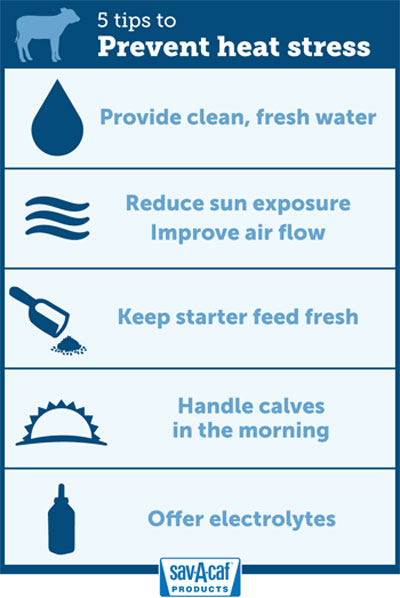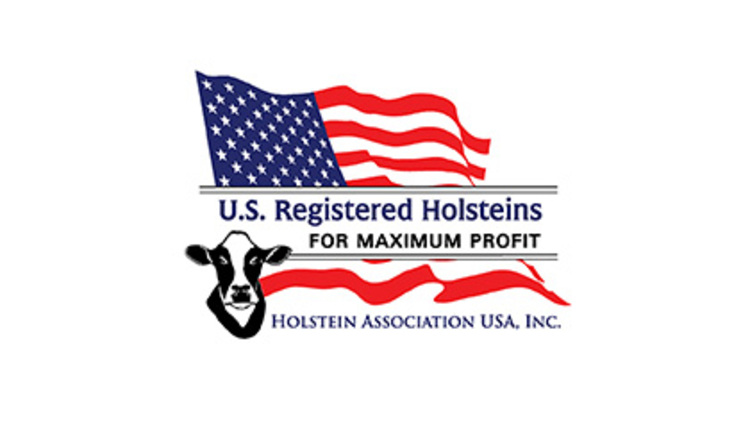The information below has been supplied by dairy marketers and other industry organizations. It has not been edited, verified or endorsed by Hoard’s Dairyman.

1. Provide clean, fresh water
The most important aspect of summertime calf raising is to provide free-choice, fresh water. Calves exposed to heat stress can consume up to 3 to 6 gallons of water each day. It is important to check availability and cleanliness of water a few times daily.
2. Adapt calf housing
Modifying your calves’ environment is one of the best ways to protect them from the weather. Reducing sun exposure can help keep calves cool as temperatures rise. Calf hutches and shelters that completely block the sun are better for keeping calves cool than opaque shelters.
Improving air flow in calves’ environment can also help keep calves cool. Naturally ventilated buildings should have all vents open. Use fans as an additional source of air flow. If you can smell ammonia in the barn, or see condensation on the walls or ceiling, it may be a sign the barn does not have adequate ventilation and should be modified.
3. Keep calf starter fresh
Closely monitor calf starter freshness during hot weather to avoid mold growth or excessive fines left in the bucket. If possible, there should be a solid partition or enough space between water and grain buckets to prevent calves from transferring water into the grain bucket.
4. Cut the stress
Stressful events can include moving, grouping new calves together, vaccinating or dehorning. Plan to perform stressful events in the morning. Evening temperatures seem cool, but animal body temperature lags the weather by four to six hours, making morning hours the best time to work with calves.
5. Know the signs of dehydration
Be sure to know the early signs of dehydration. Three key areas can help you determine if a calf is becoming dehydrated:
“Watch for early signs of heat stress in your calves. By catching hydration early, you can step in and provide calves with electrolytes immediately to help replenish fluid loss,” says Olson. “If dehydration symptoms progress, call your veterinarian to determine a treatment plan.”
For more information about keeping your calves cool or to find out more about their nutritional needs, visit: savacaf.com or like My Farm Journey on Facebook.
Milk Products, based in Chilton, Wis., manufacturers high-quality animal milk replacers and young animal health products. Using its innovative manufacturing technology, Milk Products produces over 700 unique animal nutrition products for numerous independent feed manufacturers, wholesale distributors, and large retail chains. Our customers choose whether these products are sold under their private label brand, or under the Sav-A-Caf® brand which is manufactured and marketed by Milk Products.

As summer heats up, you may find yourself spending more time in the pool, enjoying ice-cold drinks and sitting in air conditioning to keep cool. Calves also behave differently in the summer to avoid heat stress. By providing your calves with a proper environment and good management, you can help reduce heat stress from harming your calves.
"Heat stress in calves causes an increase in respiration rates and body temperature, decreased feed intake, rapid dehydration and reduced immune system function,” says Julian (Skip) Olson, DVM, technical services manager for Milk Products. “It is important for the health and well-being of your calves to avoid heat stress.”

Use these five tips to help your calves combat heat stress this summer:
1. Provide clean, fresh water
The most important aspect of summertime calf raising is to provide free-choice, fresh water. Calves exposed to heat stress can consume up to 3 to 6 gallons of water each day. It is important to check availability and cleanliness of water a few times daily.
2. Adapt calf housing
Modifying your calves’ environment is one of the best ways to protect them from the weather. Reducing sun exposure can help keep calves cool as temperatures rise. Calf hutches and shelters that completely block the sun are better for keeping calves cool than opaque shelters.
Improving air flow in calves’ environment can also help keep calves cool. Naturally ventilated buildings should have all vents open. Use fans as an additional source of air flow. If you can smell ammonia in the barn, or see condensation on the walls or ceiling, it may be a sign the barn does not have adequate ventilation and should be modified.
3. Keep calf starter fresh
Closely monitor calf starter freshness during hot weather to avoid mold growth or excessive fines left in the bucket. If possible, there should be a solid partition or enough space between water and grain buckets to prevent calves from transferring water into the grain bucket.
4. Cut the stress
Stressful events can include moving, grouping new calves together, vaccinating or dehorning. Plan to perform stressful events in the morning. Evening temperatures seem cool, but animal body temperature lags the weather by four to six hours, making morning hours the best time to work with calves.
5. Know the signs of dehydration
Be sure to know the early signs of dehydration. Three key areas can help you determine if a calf is becoming dehydrated:
- Eyes should appear bright and not sunken into their head. If a calf’s eyes are sunken, the calf is likely dehydrated
- Pinch Tests can help you determine if a calf is dehydrated. Grab a fold of skin on the calf’s neck and squeeze it together to make a tent. Once the “pinch” of skin is let go, it should go back to normal in two seconds or less. If the skin stays pinched longer, the calf is experiencing dehydration. Practice this test on animals that you are sure are well hydrated so you have the experience to recognize when the skin pinch test is slower
- Behavior is another great way to monitor a calf’s hydration level. If a calf is sluggish, slow to eat or respond during feeding time, it may be dehydrated.
“Watch for early signs of heat stress in your calves. By catching hydration early, you can step in and provide calves with electrolytes immediately to help replenish fluid loss,” says Olson. “If dehydration symptoms progress, call your veterinarian to determine a treatment plan.”
For more information about keeping your calves cool or to find out more about their nutritional needs, visit: savacaf.com or like My Farm Journey on Facebook.
Milk Products, based in Chilton, Wis., manufacturers high-quality animal milk replacers and young animal health products. Using its innovative manufacturing technology, Milk Products produces over 700 unique animal nutrition products for numerous independent feed manufacturers, wholesale distributors, and large retail chains. Our customers choose whether these products are sold under their private label brand, or under the Sav-A-Caf® brand which is manufactured and marketed by Milk Products.


